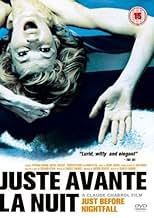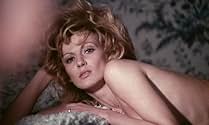IMDb-BEWERTUNG
7,2/10
2425
IHRE BEWERTUNG
Charles Masson, ein Werbefachmann, hat eine Affäre mit Laura, der Frau seines besten Freundes, des Architekten François Tellier. Charles erwürgt Laura, als eines ihrer SM-Spiele zu weit geht... Alles lesenCharles Masson, ein Werbefachmann, hat eine Affäre mit Laura, der Frau seines besten Freundes, des Architekten François Tellier. Charles erwürgt Laura, als eines ihrer SM-Spiele zu weit geht.Charles Masson, ein Werbefachmann, hat eine Affäre mit Laura, der Frau seines besten Freundes, des Architekten François Tellier. Charles erwürgt Laura, als eines ihrer SM-Spiele zu weit geht.
- Regie
- Drehbuch
- Hauptbesetzung
- 1 BAFTA Award gewonnen
- 1 Gewinn & 1 Nominierung insgesamt
Clelia Matania
- Mme Masson
- (as Clélia Matania)
Empfohlene Bewertungen
Fascinating view of middle class degeneracy in two married couples, with the less hypocritical paying to keep the whole facade going. Masochism, murder, desire for absolution, self-sacrifice. The acting and characterisation keep surprising. Like all Chabrol films it links to others in his filmography and will benefit from more viewings.
This is the most morally exquisite of Chabrol's many explorations of the human condition. Guilt, forgiveness, revenge coexist and mutually triumph. Many of us assume these three moral stances are mutually incompatible. Chabrol balances them against each other and then fuses them together. The actors reveal their inner dilemmas with gestures more than words. Deep intentions run across surface motives. And the final gesture of this compelling film casts all that went before into another, deeper level. Of course, no deed is as simple as it seems. But few appreciate as Chabrol does here that our all too common morally mixed motives can continue to coexist to the grave. No evil deed is ever straightforward, but neither are the best ones.
Had Chabrol filmed this in the style of Bergman, this film would be a Criterion Classic. But filmed as a thriller, it has sadly failed to gain the audience and admiration it so richly deserves. It is a philosophical triumph!
Had Chabrol filmed this in the style of Bergman, this film would be a Criterion Classic. But filmed as a thriller, it has sadly failed to gain the audience and admiration it so richly deserves. It is a philosophical triumph!
Possibly the best film Chabrol made, along with 'La femme Infidele' and 'Le boucher'. An intense psychological study and not really a thriller this was the first Chabrol film I ever watched. At first I was left confused and disappointed, however this powerful and moving film slowly revealed it's hidden beauty with each viewing.
This film more than any other of Chabrol's has entered my consciousness, Michael Bouquet's acting is very memorable and Stephanie Audran is astonishingly beautiful. There is no hint of mawkishness or sentimentality and one is left moved and glad of so poignant a masterpiece.
This film more than any other of Chabrol's has entered my consciousness, Michael Bouquet's acting is very memorable and Stephanie Audran is astonishingly beautiful. There is no hint of mawkishness or sentimentality and one is left moved and glad of so poignant a masterpiece.
This is one of the few satisfying movies Chabrol made in his long career. Here he has a convincing story that does not require complicated plot zig-zags. It is a simple story of adultery leading to death and the cover-up that follows. The acting is almost all fine--Francois Perier as the widower who expresses little sorrow for his dead wife is especially convincing; he's really acting, not just shrugging his way through a scene. Michel Bouquet has to make his guilt-ridden character (could have been created by Dostoievsky) interesting and sympathetic and mostly he does.
Couldn't this be issued on DVD?
Couldn't this be issued on DVD?
A man murders his best friend's wife. Guilt leads him to confess to the crime to both his friend and his wife. They in turn forgive him his act of homicide, betrayal and infidelity. This unconditional forgiveness and lack of reproach drives him to despair.
Despite the early scenes suggesting that this could be a thriller, as is the way with Claude Chabrol's other films, the narrative of Juste Avant la Nuit goes off in an entirely different direction. It uses it's opening crime not as a springboard to a suspenseful story but as a way of examining the human condition. The murder almost becomes irrelevant as we progress through the film and witness the central character become more and more depressed as a result of the love and understanding he is shown by the people who should ordinarily hate him for the ultimate betrayal he has shown them. Like other Chabrol films, this one depicts a melancholic and tragic villain. The audience are asked again to empathize with the criminal and try to understand his angst. It's morally complex and doesn't give out any answers at all. If you're looking for a traditional crime thriller this is not it. How much you enjoy this depends on how interesting you find it's central questions. I'm on the fence.
Despite the early scenes suggesting that this could be a thriller, as is the way with Claude Chabrol's other films, the narrative of Juste Avant la Nuit goes off in an entirely different direction. It uses it's opening crime not as a springboard to a suspenseful story but as a way of examining the human condition. The murder almost becomes irrelevant as we progress through the film and witness the central character become more and more depressed as a result of the love and understanding he is shown by the people who should ordinarily hate him for the ultimate betrayal he has shown them. Like other Chabrol films, this one depicts a melancholic and tragic villain. The audience are asked again to empathize with the criminal and try to understand his angst. It's morally complex and doesn't give out any answers at all. If you're looking for a traditional crime thriller this is not it. How much you enjoy this depends on how interesting you find it's central questions. I'm on the fence.
Wusstest du schon
- WissenswertesThis is the last film of Claude Chabrol's 'Hélène cycle', in which actress Stéphane Audran starred, playing characters called Hélène in Die untreue Frau (1969), Der Schlachter (1970), and Der Riss (1970). The only film in the cycle which Audran didn't star in was Claude Chabrol´s Das Biest muss sterben (1969), the role of a character called Hélène was instead played by Caroline Cellier.
- VerbindungenVersion of Onna no naka ni iru tanin (1966)
- SoundtracksSilent Night
Original lyrics by Joseph Mohr and music by Franz Xaver Gruber, French lyrics by unknown lyricst
Played and sung in the Christmas morning scene
Top-Auswahl
Melde dich zum Bewerten an und greife auf die Watchlist für personalisierte Empfehlungen zu.
- How long is Just Before Nightfall?Powered by Alexa
Details
Zu dieser Seite beitragen
Bearbeitung vorschlagen oder fehlenden Inhalt hinzufügen



















